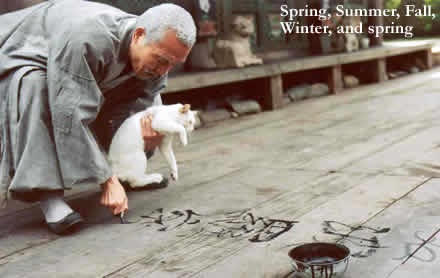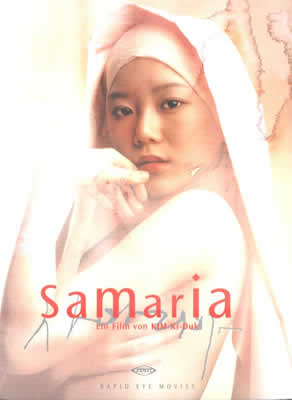Since the turn of the new millennium South Korean Cinema has been on the rise. The Korean Wave (or “Hallyu”) has swept through Asia, and is slowly washing upon the shores here in the west. The Korean film industry has previously been overshadowed by the neighboring Cinema’s of Hong Kong and Japan, but the industry is now ranked ninth in the world in terms of gross revenue. Korean directors have found international success in almost every genre of film. From action-thrillers such as Chan Wook-Park’s Oldboy, to horror blockbusters like Kim Ji-Woon’s A Tale of Two Sisters, and art house features, such as Kim Ki-Duk’s Spring, Summer, Fall, Winter, and spring.
The sudden international appeal of the Korean cinema has come as a surprise to film buffs around the world. Korean films were traditionally a tool to display Korean angst over the division from their neighbors in the north, and the struggles to preserve Korean culture from western influence. Throughout the 20’s, 30’s, and 40’s majority of Korean film were seen as poor quality when compared to their Japanese, Korean, and Hollywood counterparts. During the early 50’s the political tension resulted in Korea being divided into a northern and southern peninsula, and escalated into a war that lasted towards the middle of the decade. By the end of the war the Korean peninsula was spilt in terms of land and culture, with the south emerging as the bastion of Korean art and culture on the world stage. From the late 50’s into the early 80’s the South Korean film industry experiences what is know referred to as its golden age. Majority of the films that were produced during this time period were a direct reflection of the political and social turmoil’s that were affecting Korea at the time, such as The Housemaid and Aimless Bullet which are often regarded by many film critics to be among two of the greatest international films ever made. What made this era of Korean films particular special was the artistic and financial freedom that directors and actors had  throughout the era. But by the middle of the 60’s, a new government ascended to power in Korea and government control over the film industry drastically increased. The government instituted strict censorship policies over sexual content, violence, and specifically any type of pro- communist references. The government also instituted a quota on the number of foreign films that were allowed into the country. The lack of creative control over their productions led to the closing of over 60 percent of the production companies in the country.
throughout the era. But by the middle of the 60’s, a new government ascended to power in Korea and government control over the film industry drastically increased. The government instituted strict censorship policies over sexual content, violence, and specifically any type of pro- communist references. The government also instituted a quota on the number of foreign films that were allowed into the country. The lack of creative control over their productions led to the closing of over 60 percent of the production companies in the country.
During the early to mid 70’s the South Korean government’s dominance over it’s countries film industry was compared to that over its neighbor’s to the north, and also that of Nazi Germany. When tickets sales began the wane throughout the 80’s the government became less stringent on its policies, but by this point Korea’s main film audience had already disappeared. Majority of the films that were produced during this time period were government motivated, and were filled with numerous elements of political propaganda. The Korean film industry gradually took a back seat to the
emerging popularity of television.
Into the early 90’s Korean film attendance reached an all time low, and numerous members of the South Korean film community protested the governments dealing with the United States which resulted in a budget cut for films made in the country. In 1999 director Kang Je-Gyu took a risk with his fairly high budgeted spy-action thriller Shiri. At the time of its release Shiri became the highest  grossing film in Korean history and outsold Hollywood films such as Titanic and The Matrix. Shiri is now referred to as the film the initiated the Korean wave or (Hallyu) throughout Asia and Europe. Because of the success of Shiri Korean film directors were inclined to take bigger risk and make higher budget films. The following year Chan Wook-Park topped the record set by Shiri with his political drama Joint Security Area. By this time it had become apparent that Korean directors had reverted back to the themes of the Golden Age of Korean cinema by making films that dealt with politics and social angst that plague Koreans to this day. The success of these and numerous other Korean film throughout the new millennium have led to a number American production companies buying the rights to distribute these films in America via DVD, and also buying the rights with the intention of remaking them with a Hollywood cast.
grossing film in Korean history and outsold Hollywood films such as Titanic and The Matrix. Shiri is now referred to as the film the initiated the Korean wave or (Hallyu) throughout Asia and Europe. Because of the success of Shiri Korean film directors were inclined to take bigger risk and make higher budget films. The following year Chan Wook-Park topped the record set by Shiri with his political drama Joint Security Area. By this time it had become apparent that Korean directors had reverted back to the themes of the Golden Age of Korean cinema by making films that dealt with politics and social angst that plague Koreans to this day. The success of these and numerous other Korean film throughout the new millennium have led to a number American production companies buying the rights to distribute these films in America via DVD, and also buying the rights with the intention of remaking them with a Hollywood cast.
The majority of Korean film success is not solely based on box office performance. There have been several films, (notably the films of Kim Ki-Duk), which have made an impact on festivals throughout the world. In 2004 Kim Ki-Duk’s film Samaria earned him the award for best director at the Berlin International Film Festival, He also won runner up for best picture at the Venice Film Festival for his film 3-Iron. Many critics attribute the success of Korean films to the fact that directors are transitioning to a more Hollywood style of filmmaking, but this is not always the case. One of South Korea’s most successful and internationally appealing films is the romantic comedy My Sassy Girl, a Korean styled film in every sense. The films brilliant and quirky humor made it irresistible to foreign audiences and filmmakers and with an American remake scheduled for release later this year, the film’s popularity will continue to grow nearly seven years after its release.
The continuing growth and popularity of Korean films across the world shows that in the film industry there is a certain formula that results in success. By sticking to the values and foundations of culture and history, films can be produced which appeal both domestically and internationally, and can be profitable and still appreciated as art.

